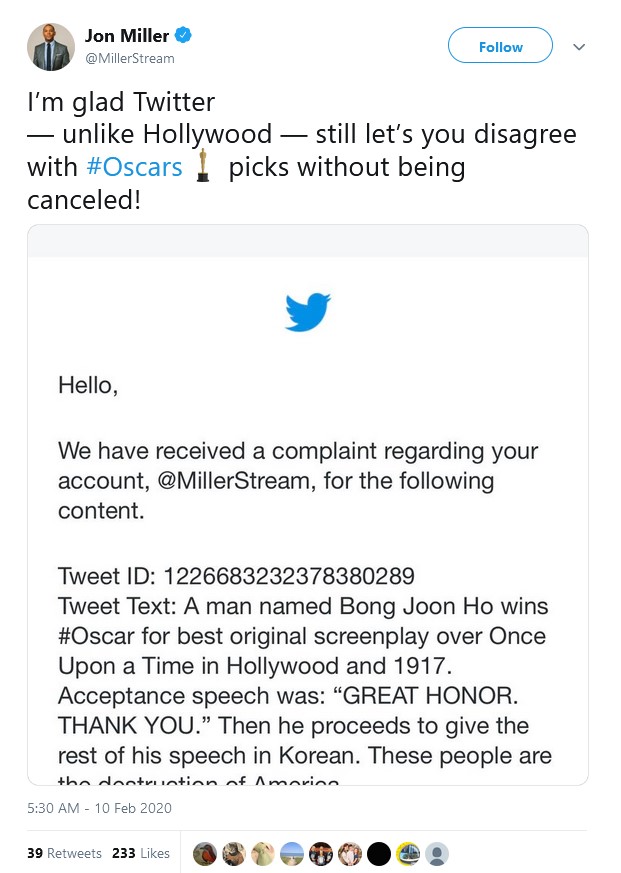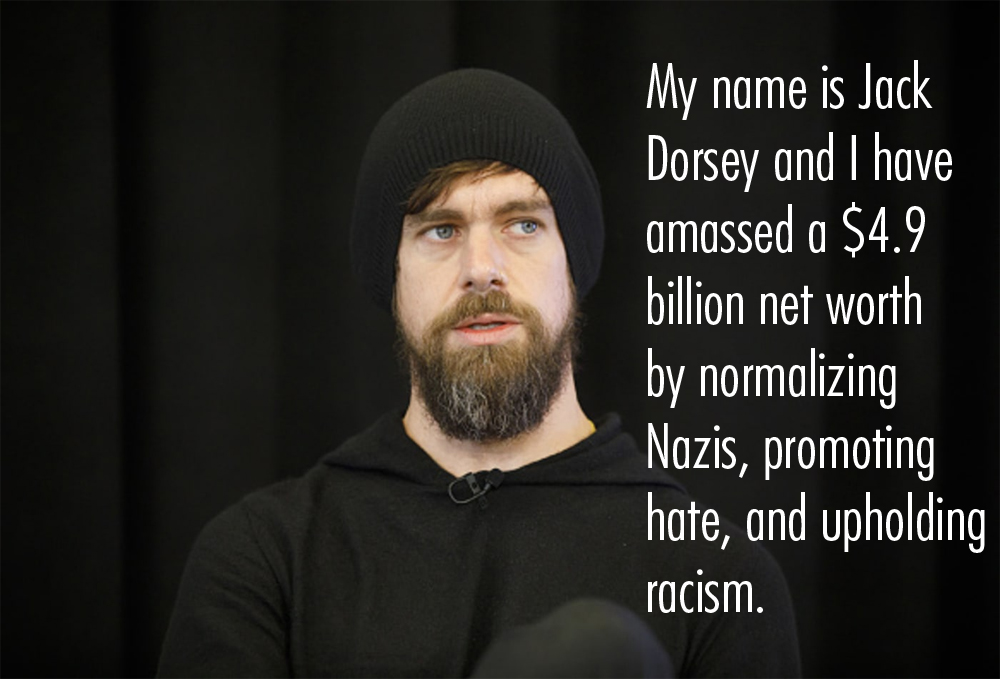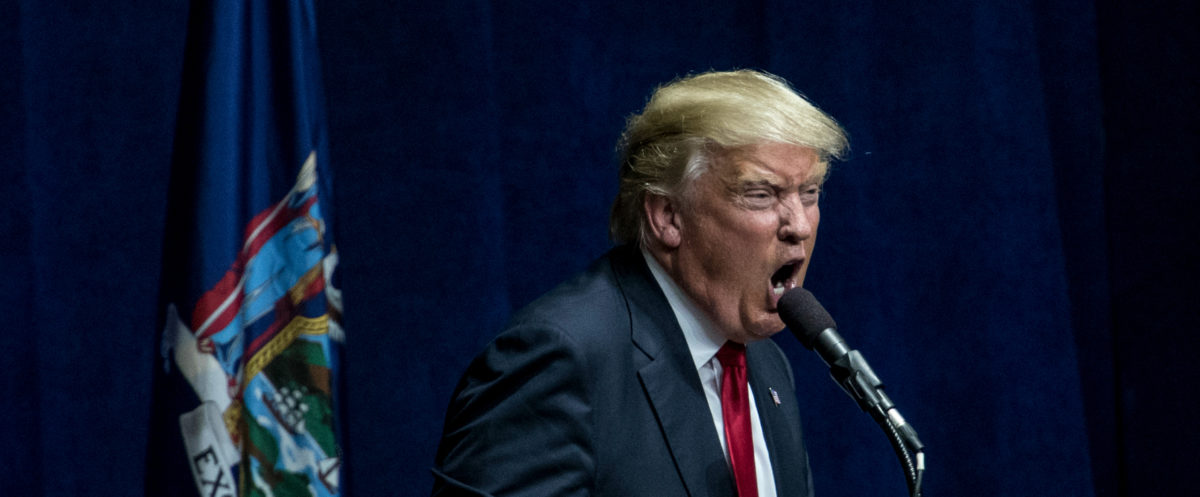This morning, I learned that my Twitter account was permanently suspended and that I was banned from the social media platform because I had the temerity to express anger and outrage towards a racist.
 A man with a blue checkmark by the name of Jon Miller, a conservative “White House correspondent for BlazeTV,” tweeted an insulting, cruelly disparaging, and racist message mocking the great filmmaker Bong Joon-ho after he delivered one of his Oscar speeches in Korean. Miller’s disturbingly xenophobic words, which are still published on Twitter as of Monday morning, proceeded to claim that “these people are the destruction of America.” This is language that echoes anti-Semitism in 1930s Germany and any number of hate groups singled out by the Southern Poverty Law Center. Words that need to be strongly protested. Even conservative Piers Morgan protested it. Miller’s tweet was rightly ratioed, but thousands of people still retweeted and favorited this vile expression. Miller, in other words, willfully promulgated hate.
A man with a blue checkmark by the name of Jon Miller, a conservative “White House correspondent for BlazeTV,” tweeted an insulting, cruelly disparaging, and racist message mocking the great filmmaker Bong Joon-ho after he delivered one of his Oscar speeches in Korean. Miller’s disturbingly xenophobic words, which are still published on Twitter as of Monday morning, proceeded to claim that “these people are the destruction of America.” This is language that echoes anti-Semitism in 1930s Germany and any number of hate groups singled out by the Southern Poverty Law Center. Words that need to be strongly protested. Even conservative Piers Morgan protested it. Miller’s tweet was rightly ratioed, but thousands of people still retweeted and favorited this vile expression. Miller, in other words, willfully promulgated hate.
As someone who is a big proponent of democracy and multiculturalism and as someone who has a number of Korean friends, some who greatly helped me during a time of crisis in my life, it was my moral duty as a citizen to lodge my protest against this in the strongest possible terms. Bong Joon-ho’s Oscar win for Parasite is not only a historical and artistic triumph. It also rightly sends a message to Korean Americans that their dreams are possible. By any objective standard, this is a good thing and a beautiful advancement of humanity. For someone to shit on this — as Miller did — is to besmirch the very purpose of why and how we evolve as a species.
So I got angry on Twitter. One cannot stay silent when anyone is demeaned and stripped of his dignity like this. But as far as Twitter is concerned, calling someone “a xenophobic, anti-tolerance, anti-art fuckface” — as I did — for expressing such hateful language is “abuse and harassment.” Moreover, there is no appeal for Twitter’s decision. The appeal link that I received by email did not work.
On Twitter, I also challenged Miller to a ten round boxing match to see if he wanted to settle this matter like a man. I did this for a number of reasons. First, I’ve been on a fitness kick and it seemed like a playful way of opposing a racist. Second, my challenge offered a corporeal method of resolving a national cancer that needs to see more resolution in the real world. Racism has long been buried underneath the surface of this nation. And if Miller wants to claim that an entire race is “destroying America,” then let us see if he has the stones to say this in public and in the ring. If Miller still wants to take me up on my challenge, then I will be more than happy to sign up for boxing lessons immediately and get in the best shape of my life. That’s how much I care about fighting racism and intolerance. I’m willing to put my body on the line. It is my position that, when you are confronted with racism, you must not stay silent about it and you have an obligation to fight it.
My playful boxing challenge also falls into a great tradition of writers boxing other writers — seen with Craig Davidson challenging Jonathan Ames to a boxing match, a match, incidentally, that I happened to announce. I’m sure that this probably factored into Twitter’s decision. Still, challenging someone to a boxing match does not involve “wishing or hoping that someone experiences physical pain” — the codex behind Twitter’s rules. The decision to engage in a fight is on Miller. I have challenged him. He is free to take me up on the challenge. I’m willing to put myself on the line and in the ring, but my ultimate wish or hope would be to see Miller acknowledging and confronting and sincerely apologizing for his flagrant racism and unacceptable xenophobia. That’s the goal here. Since Miller proved intransigent on Twitter, I was forced to take him up with my boxing challenge. Even if Miller decides not to box me, then the point has been made. Unable to walk back his hateful remarks, he is revealed for the coward that he is.
What all this does tell us is that Twitter is firmly on the side of the fascists and the racists and the doxxers and the misogynists and the Nazis and the authoritarians. Jack Dorsey’s business model is to promote hate and to block anyone who pushes strongly against it. Because hate and sustaining the status quo of hate and racism is very good for Dorsey’s business model. It’s lining his pockets right now. My words to Miller were no different than the words that got the great David Simon (temporarily) banned in 2018. As Simon put it in a blog post shortly after his suspension:
The correct response to racism, to white supremacy, to anti-Semitism, to slander and libel is to:
1. Tell the fucker he’s a piece of shit and should die of throat clap.
2. Block him. And in doing 1. and 2. you have marked the spot for the sane and sentient on Twitter, much as any good infantryman who wanders into a minefield marks the Claymores for the rest of the platoon. It’s just good soldiering, Jack.
My Twitter ban may very well be a blessing in disguise and should give me more time to practice my guitar and the new set of harmonicas I just purchased. But it is still part of a national disease that is silencing and squelching voices who speak out against hate, racism, and fascism. A few friends texted me this morning about what happened and claimed my ban to be “a badge of honor.” But I don’t see this as honorable at all. I see this as a deep stain against social justice and a blow against fighting for what’s objectively right. I see this as Jack Dorsey willfully prioritizing hate before justice and profit before human decency. But then we all know that Jack Dorsey has no soul. We know that this shallow profiteer met with Trump last year. If he possessed any qualities of actual decency and if he was truly invested in true discourse, then he would understand precisely what’s at stake here. If we cannot speak out against racism and human indignity, then how will we be able to speak out against any other significant human ills that crop up in the next few years? Especially if Trump manages to win a second presidential term and the Senate remains under control by the Republicans. You don’t win battles by keeping silent or by staying neutral against a gleeful hate merchant like Jon Miller. You call them out for the repugnant atavists and venal promoters of bigotry and intolerance that they are. You challenge them to boxing matches if you have to.
UPDATE: This morning, Jon Miller celebrated the fact that Twitter ruled his racist tweet as something that did “not identify any violations of the Twitter Rules.” Twitter, in other words, is clearly in the practice of upholding racism.


